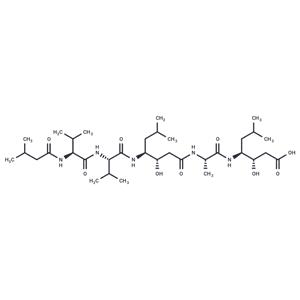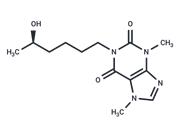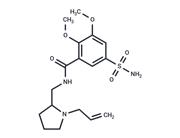| Name | Pepstatin |
| Description | Pepstatin (Pepsin Inhibitor S 735A) is an aspartate protease inhibitor that also inhibits HIV protease activity with specific and oral activity. Pepstatin inhibits autophagy. |
| Cell Research | Pepstatin A is freshly dissolved in DMSO at 7 mM. It is very slowly diluted (1:100) into the medium of HIV-infected H9 suspension cultures so that no pepstatin A precipitated (final concentration, 70 μM pepstatin A and 1% DMSO), and the cultures are incubated without change of culture medium for 48 hr. As a control, uninfected H9 cells are also incubated with pepstatin and in addition HIV infected and uninfected cells are incubated with 1% DMSO but without pepstatin [2]. |
| Animal Research | To investigate the effect of pepsins on bacterial motility, similar experiments were performed, but the pepsin in the stomach was inactivated by rinsing the stomach with pepstatin (100 μl of a 2-mg/ml stock solution). Samples were taken and analyzed for bacterial motility at the test pH values of 2.0, 3.0, 4.0, 4.5, and 5.0 and at the same periods after application of the bacterial suspension as in the experiments with active pepsins [4]. |
| In vitro | METHODS: F. pedrosoi sclerotic cells were treated with Pepstatin (0.1-20 µM) for 20 h and cell viability was measured by CFU assay.
RESULTS: Pepstatin was able to block the viability of sclerotic cells in a typical dose-dependent manner. [1]
METHODS: SV40-transformed skin fibroblasts were treated with Pepstatin (100 µM) for 1 h, then incubated with doxorubicin (1 µM) or TNF-α (50 ng/mL) in 1% FCS for 48 h. Cell viability was measured by MTT assay.
RESULTS: Cathepsin D activity was strongly inhibited by pretreatment of human cells with 100 µM Pepstatin. Despite this inhibition, cell death induced by doxorubicin or TNF-α in fibroblasts was not prevented by Pepstatin. [2] |
| In vivo | METHODS: To examine the kinetics of inhibition in vivo, pepstatin (25-200 mg/kg) was administered intraperitoneally to CD-1 mice.
RESULTS: In the liver, significant inhibition of cathepsin D persisted for at least 15 days, whereas in the heart and skeletal muscle this inhibition lasted for a much shorter period. The return of enzyme activity to normal values was dose-dependent, and there were significant differences in the recovery of enzyme activity in these organ tissues at the same dose level, with the liver being the most sensitive. [3] |
| Storage | keep away from moisture | Powder: -20°C for 3 years | In solvent: -80°C for 1 year | Shipping with blue ice. |
| Solubility Information | Ethanol : 1 mg/mL (1.46 mM)
H2O : Insoluble
DMSO : 25 mg/mL (36.45 mM)
|
| Keywords | Inhibitor | inhibit | Pepstatin | HIV Protease | Proteasome | Autophagy |
| Inhibitors Related | Stavudine | Emtricitabine | Sodium 4-phenylbutyrate | Hydroxychloroquine | Guanidine hydrochloride | Lamivudine | Paeonol | Naringin | Gefitinib |
| Related Compound Libraries | Bioactive Compound Library | Rare Natural Product Library | Peptide Compound Library | Inhibitor Library | Microbial Natural Product Library | NO PAINS Compound Library | Natural Product Library for HTS | Anti-infective Natural Product Library | Bioactive Compounds Library Max | Anti-Cancer Active Compound Library |

 United States
United States



